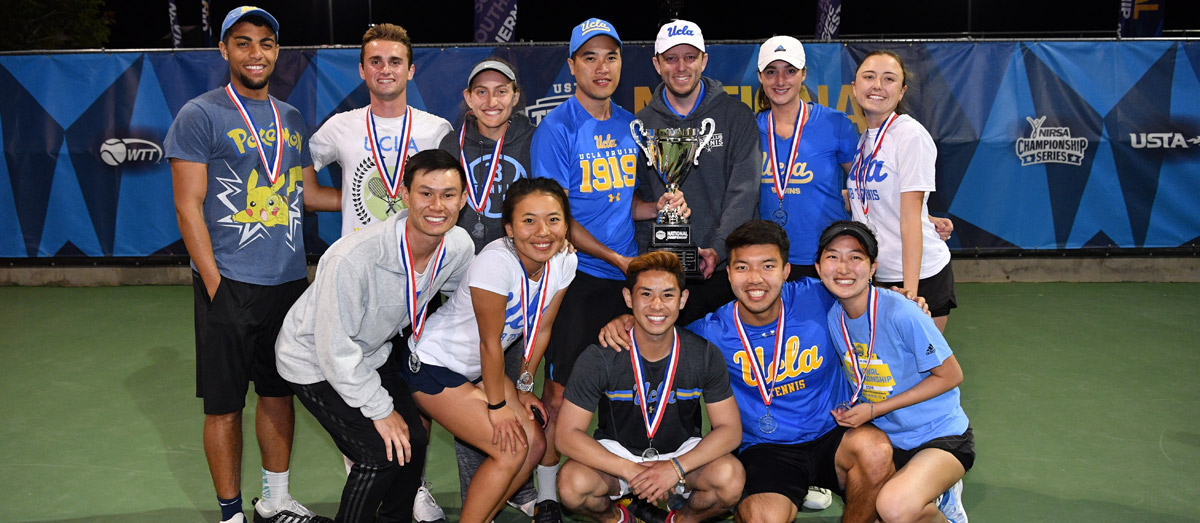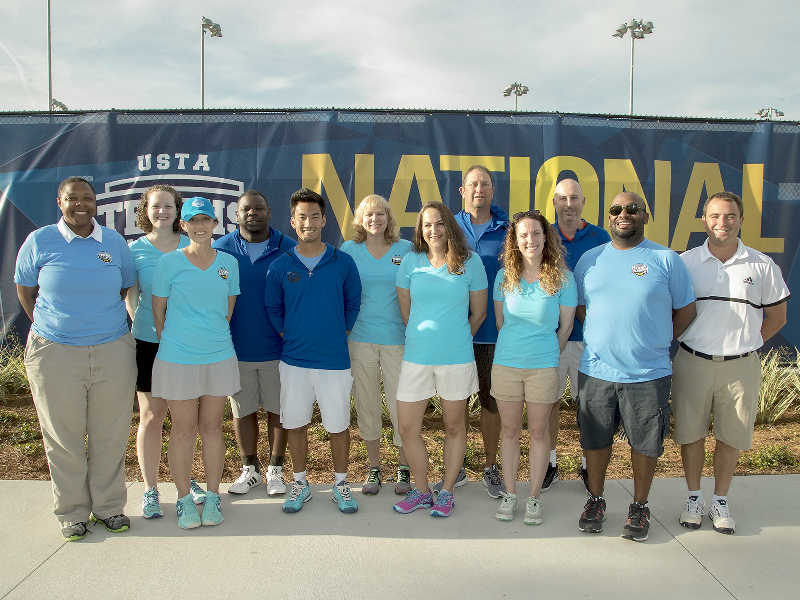Roster:
Temi Adelakun – Senior
Ana Chernova – Sophomore
Kayla Garcia – Junior
Alexandra Gorodiski – Freshman
Andrea Kinnerk – Senior
Jack Klein – Junior
Jon Mulvey – Senior
Andrew Weitzer – Senior
Tim Worley – Senior
Teams defeated this season: Wisconsin, Illinois, Notre Dame, Indiana, Butler, Iowa State, North Dakota State, Toledo, UIC, UW-Milwaukee, UW-Whitewater, UW-Platteville, Valparaiso, Ohio, Illinois State, Loyola, UChicago, Illinois Tech, Columbia College
Q: How did you first hear about the Tennis on Campus program? What made you decide to actively take part and also become a leader on your campus? How do you feel about TOC and being a captain?
I first heard about Tennis on Campus when I enrolled at DePaul University in the fall of 2011. At that time, I was a 24-year-old freshman creating my own degree program, tailored specifically to Tennis Management through the university's School for New Learning. My initial plan was to eventually walk-on to the men's varsity team, but I quickly realized the potential for Club Tennis at DePaul and became hooked on the idea of creating something new. The club itself was a mess when I first arrived—it was on probation, had five members and no money—but there was an opportunity to develop an organization and brand from the ground up, which was something I had done quite a bit in my previous life working in web development and online community management. Once I realized the opportunities Club Tennis offered me as a student leader, I threw myself wholeheartedly into developing the club and I have worked on it 20-30 hours a week, every week, for the past five years.
I love being captain and coach of my team and I wouldn't trade any of our experiences over the past five years for anything else in the world. I also wouldn't trade any of our club members for anyone else in the entire country. All of my best friends are on this team. Every one of them has contributed their own unique individual characteristics to create this club and make us into what we are. The Tennis on Campus program itself has provided me with an avenue to grow and develop as a leader both on and off the court. Leadership skills like public speaking and decision-making—things with which I often struggled in the past—have now become second nature to me. I volunteered for DePaul's student funding board, was hired by the university's Ray Meyer and Fitness Recreation Center, and I've taken on the responsibility of mentoring and developing other club sports leaders on campus. Had I not become President of Club Tennis when I did, all of this most likely never would have happened.
Q: How did you enjoy your National Championships experience last year?
This is only the second time we have qualified for Nationals in our club's history and the first time since 2013. For our two seniors who traveled with us to Surprise as freshman three years ago, their college careers have come full circle. Nationals in 2013 was the best experience we've had in college. It was the first time our club had traveled outside of the Midwest to compete at a tournament. Over the course of that week, we grew closer together than any one of us could have imagined. We're all looking forward to going back and creating those same sort of memories for the Nationals first-timers on our team. For six out of the nine people on our roster, it will be their first experience.
Q: What does it mean to be back? Was it a more difficult road to return to Nationals?
Qualifying for Nationals the way we did this year means so much to all of us who have worked so hard to improve on the court. When we were at Nationals in 2013, we received an automatic bid as Midwest Club of the Year. This time, we qualified through the Midwest tournament. For a non-Big Ten school like ours, qualifying through the Midwest Sectional tournament is nearly impossible. In all honesty, we went in telling ourselves we had a one-in-100 chance of making it to Nationals. In our entire club history, as successful as we have been, we had never made it past the first round of the Midwest gold knockout draw. We had never even won our pool before.
This year, we were drawn against Notre Dame, one of the strongest teams in the Midwest, in the round of sixteen. We fought hard for the first four sets, but were still down three games going into mixed. Our mixed doubles team, made up of seniors Andrea Kinnerk and Temi Adelakun—who have been playing mixed together for more than three years—stepped up and won the set, 6-2, to win the match outright, 23-22, and take us through to the next knockout round. We lost in the quarterfinals to eventual Midwest runners-up Wisconsin, but were still drawn against a fantastic team from Butler in the last chance bracket to play for a spot at Nationals. The team came together and we won the match, 29-16, with an ace on match point from junior Jack Klein, who had only arrived at the tournament two hours earlier after finishing several school projects in Chicago before driving himself the three hours to Madison.
Q: In what ways has your team improved this year?
We've come an extremely long way over the past five years, but in the past year specifically, we've grown on several different fronts. First of all, we founded a B team to allow more of our players to travel and compete. The B team has given more than 15 club members who would normally have never been able to represent the university an opportunity to do so at Midwest tournaments and in April at the Spring Invitational. In October, the B team placed third at a 16-team tournament in Milwaukee that featured 13 other A teams from around the Midwest. We've added another night of indoor club practices and expanded practice on each of the other three nights a week. Instead of having 20-30 people at our full club practices on Tuesday nights, we've had between 40-50 at every practice all year.
As a club, we've also concentrated on expanding our volunteer work within the Chicago community. Our biggest event this past fall was participating in a 5K fundraiser for a local organization which raised over $20,000 to help prevent domestic violence and provide services for displaced women. We've worked longer and harder, both on and off the court, than we ever have before.
Q: What do you tell new players about Nationals, or players that are traveling for the first time to compete for your school?
Nationals is an entirely different experience to any other tournament, including the Spring Invitational in Arizona, which usually serves as the capstone of our season. There's no way to truly describe the atmosphere to anyone who will be experiencing it for the first time. When they look back in 5-10 year’s time, competing and representing DePaul University at this tournament will be the defining moment of their Club Tennis experience. Guaranteed.
Q: Who was your toughest opponent at past Nationals and how did they challenge you to become better?
We've been challenged most by opponents from within our own Midwest section. All of us believe we have by far the toughest section overall and the most difficult road to Nationals. Were we a part of a smaller section, we might qualify for Nationals every year, but in the Midwest you have to play well in every single match at Sectionals or your opportunity to qualify disappears in an instant. To fully appreciate the quality of our section, you just have to look at some of the schools which didn't make it to Nationals this time around. This year was the first time we've ever won our pool and the first time we've made it past the round of sixteen. We've always known that we would have to play almost perfect tennis to qualify in our section, and that's exactly what we did. I couldn't be any more proud of how hard everyone has worked to put ourselves in that position.
Q: Does your team actively use social media to stay connected? If so, what social media platforms are your favorites? Does your team use social media in any special way that you feel sets you apart from other teams?
We truly believe we are one of the most visible clubs in the country because of our Internet presence. We have a fantastic website which serves as an archive of everything we've done; active Facebook, Twitter, and Instagram accounts that keep members, friends, and family members connected; and a YouTube channel with nearly 100 videos and more than 30,000 views telling the story of our club, tournament by tournament, over the past five years.
We believe our YouTube channel really sets us apart from other club teams. Players from schools all around the country recognize us at tournaments because of our videos. When you search for “Tennis on Campus” on YouTube, half of the returned results are of us. On campus here in Chicago, the videos serve as a recruiting tool for new members and incoming freshman. At our yearly fall involvement fair in Lincoln Park, the most common comment we receive is “I saw your videos on YouTube and I want to be in them.” Hearing students say things like that makes all of the hours spent recording and editing worth it. Ten to 15 years down the road, club members will be able to go back and re-live their entire Club Tennis experience on video.
Share with us some of the ways you help out in the local and global communities in the name of tennis.
Within our own DePaul community, we pride ourselves on giving students, staff and alumni the opportunity to continue playing tennis. DePaul University has no courts on campus. When we started rebuilding Club Tennis five years ago, finding places to play was next to impossible. We had no money and no real connections. Fast forward five years, and we're practicing indoors at a private club near campus four nights a week for the entire academic year. This year, we've had 40-50 people at our full club practices all year long, including 68 at our first practice in the fall. For the first time in our club's history, we've gone over 100 total club members for the year.
We also have a firm policy of not cutting anyone from our team. Unlike most schools who can't accommodate such large numbers of players, it's one of the defining pillars of our club. If more people want to join, we will find a way to book more courts and add more nights of practice to give those people an opportunity to play. We're focused on growing the game here on campus in Lincoln Park and providing an outlet for all those who want to continue playing.
Share with us a funny story about the 2015 team or team member(s).
This story is more remarkable than funny, but it aptly illustrates how much this club means to all of us. Andrea Kinnerk has been captain of the women's side of our team for four years. She's a senior now, but during her freshman year, she tried out for the DePaul Women's Varsity Tennis Team and missed out on making it by one spot. After tryouts during her first quarter at the university, she thought she would try Club Tennis, not thinking she should ever have an opportunity to compete and represent her school. Well, she's been playing with us ever since, competing at every tournament we've entered over the past three years as one of the top girls in the entire Midwest section.
In the fall, Andrea took part in DePaul's Los Angeles immersion quarter for her film degree. This was a fantastic opportunity for her, but it also meant she wouldn't be available to play during our fall season. In November, we were making preparations to play at our biggest tournament of the fall, the 32-team Badger Classic hosted by the University of Wisconsin-Madison. Andrea took it upon herself to fly from Los Angeles to Chicago specifically so she could compete at that tournament. After surprising everyone the day we left and playing well that weekend, she returned to LA the following Monday to finish out her quarter. A quick 72-hour trip which meant the world to all of us.
Andrea's decision to fly in for that weekend's tournament shows just how much she loves this club, how it helps define who she is, and how deeply connected we all are to each other.
If a local newspaper was to write a story about your team what is the one thing you’d want to make sure they included?
We would like them to include a comparison of where we were as a club five years ago to where we are now. Five years ago, our club was on the verge of being shut down by the university. We were on probation, had no money, five members playing on crumbling public courts, and we didn't travel. Now, our club budget is $30,000 a year, we have had over 100 members come out to our practices this academic year, and our current travel schedule has us playing 65 matches this year.
Another story we love to tell is about the relationship we have developed with our two varsity tennis teams, specifically the women's team coached by Mark Ardizzone. Coach Mark is a huge supporter of our club. Three years ago, he and I worked together to setup a joint practice between Club Tennis and his girls. Every October since, we've gotten together on a Saturday afternoon and Mark has put together two hours worth of drills for 30-40 club members, run them through their paces, and then provided food and drinks for everyone after it was over. He has gone well above and beyond what most other varsity coaches would do to support their club teams and we feel extremely fortunate to have him at our university, providing opportunities for us the way he does.
Had you told me five years ago that we would be where we are right now, doing the things we're doing, I wouldn't have believed you.



